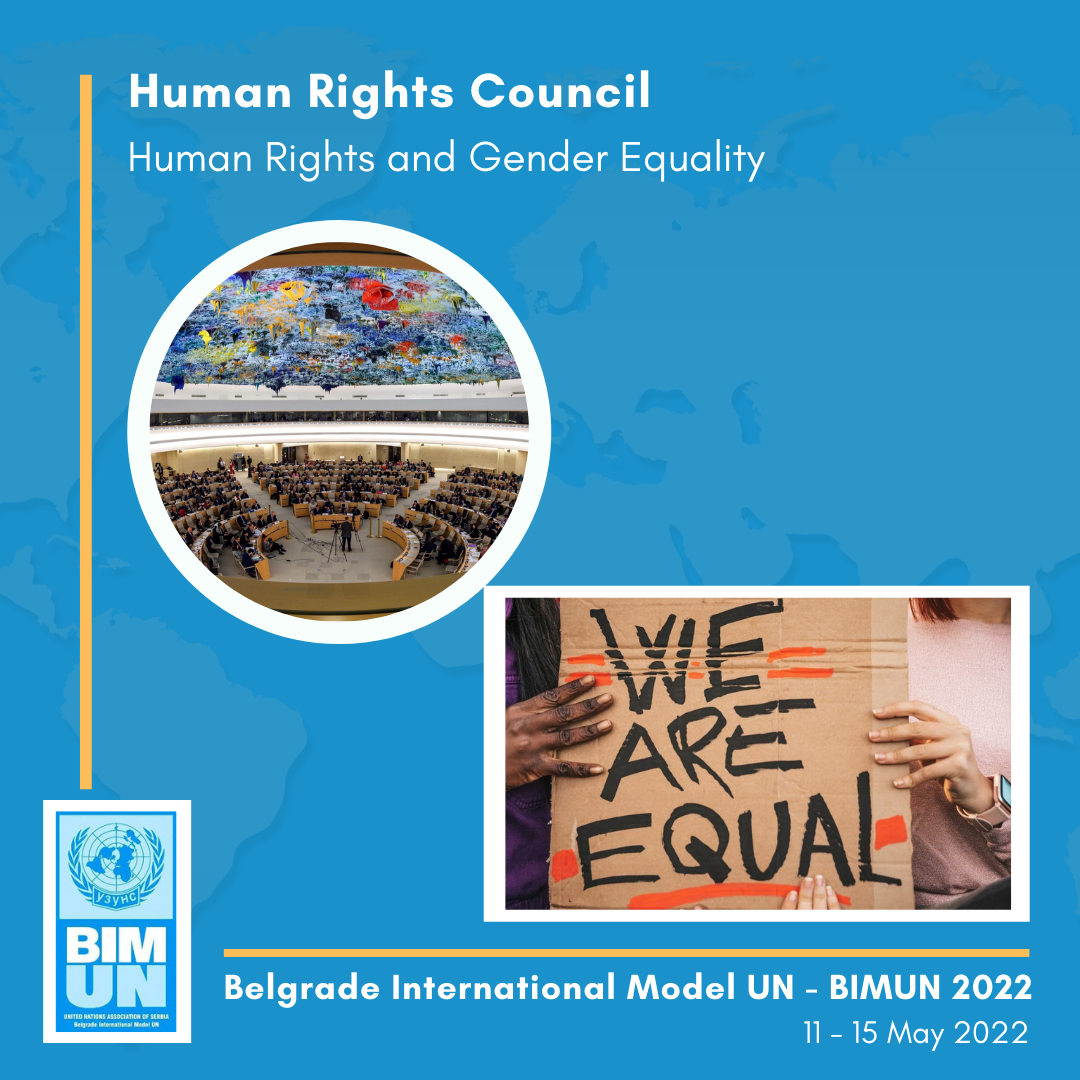Topic
| Human Rights Council | Topic | Member states | Links and documents | Contact |
|---|
 Topic: “Human Rights and Gender Equality”
Topic: “Human Rights and Gender Equality”
Gender equality is one of the most important fundamental human rights. It implies a world where all legal, social and economical opportunities are equal for men and women. Not only is gender equality recognized as Goal 5 of the Sustainable Development Goals, but it also includes the goal to empower all women and girls.
Gender inequalities have persisted through history and created many discriminations and stereotypes which remain till today. Over the years, women have been exposed to domestic and sexual violence, forced marriage, FGM (female genital mutilation) and everyday discrimination.
While there has been progress in the last decades, women are still unequal with men. They are underrepresented in political activity and property ownership. What is more, the outbreak of the pandemic has threatened the situation of women from health and the economy, to security and social protection.
A new global analysis of progress on gender equality and women’s rights shows women and girls remain disproportionately affected by the socioeconomic fallout from the COVID-19 pandemic, struggling with disproportionately high job and livelihood losses, education disruptions and increased burdens of unpaid care work. Women’s health services, poorly funded even before the pandemic, faced major disruptions, undermining women’s sexual and reproductive health. The global gender gap in food security has risen dramatically during the pandemic, with more women and girls going hungry. The number of employed women declined by 54 million in 2020 and 45 million women left the labour market altogether. Men's average wages are higher than women's in both rural and urban areas. Rural women typically work longer hours than men, due to additional reproductive, domestic and care responsibilities. Inequality between women and men has been clearly identified as one of the causes blocking development over the last two decades.
While gender equality is a global challenge for everyone it is particularly a problem for nations in the Middle East, Africa and Asia. Countries such as Afghanistan, Yemen, Syria and Pakistan must face major obstacles in order to overcome gender inequality. According to the Global Gender Gap report 2021, Afghanistan was the least gender equal country in the world. In the southeastern provinces of the country it is even harder due to the long lasting effect. Chad is the worst ranked country in the world when it comes to gender gap in education. It is also the lowest ranked nation for gender equality in Sub-Saharan Region. Pakistan is ranked low on gender equality, especially in education with a literacy rate for men that is 70% compared to women with 46%.
UN support for the rights of women began with the Organization's founding Charter. Within the UN’s first year, the Economic and Social Council established its Commission on the Status of Women. Among its earliest accomplishments was ensuring gender neutral language in the draft Universal Declarations of Human Rights. Gender Equality was made part of international human rights law by the Universal Declaration of Human Rights, which was adopted by the UN General Assembly on 10 December 1948. In 1979, the General Assembly adopted the the Convention on the Elimination of All Forms of Discrimination against Women, which is often described as an International Bill of Rights for Women. In its 30 articles, the Convention explicitly defines discrimination against women and sets up an agenda for national action to end such discrimination. Apart from these, the most important conventions and declarations related to Gender Equality are Convention on the Political Rights of Women(1954), Convention to the Consent of Marriage, Minimum Age of Marriage, and Registration of Marriages(1964), Declaration on the Protection of Women and Children in Emergency and Armed Conflict(1974), Declaration of the Elimination of Violence against Women (1993), Beijing Declaration and Platform for Action(PFA) (1995), Convention on preventing and combating violence against women and domestic violence(Istanbul Convention) (2014) etc.
1. How can gender equality be achieved?
2. What can be implemented to reduce and potentially stop gender inequality?
3. What are the main gender inequality problems in your country?
